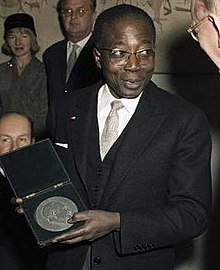Léopold Sédar Senghor
| Léopold Sédar Senghor | |
|---|---|
 |
|
| 1st President of Senegal | |
|
In office 6 September 1960 – 31 December 1980 |
|
| Prime Minister | Abdou Diouf |
| Preceded by | Office created |
| Succeeded by | Abdou Diouf |
| Personal details | |
| Born |
9 October 1906 Joal, French West Africa (present-day Senegal) |
| Died | 20 December 2001 (aged 95) Verson, France |
| Political party | Socialist Party of Senegal |
| Spouse(s) | Ginette Éboué (1946-1956) Colette Hubert Senghor (m. 1957–2001); his death |
| Alma mater | University of Paris |
| Religion | Roman Catholicism |
| Signature |  |
Léopold Sédar Senghor (9 October 1906 – 20 December 2001) was a Senegalese poet, politician, and cultural theorist who for two decades served as the first president of Senegal (1960–80). Senghor was the first African elected as a member of the Académie française. Before independence, he founded the political party called the Senegalese Democratic Bloc. He is regarded by many as one of the most important African intellectuals of the 20th century.
Senghor's first marriage was to Ginette Éboué, daughter of Félix Éboué. His second wife, Colette Hubert, who was from France, became Senegal's first First Lady upon independence in 1960. Senghor had three sons between his two marriages.
Léopold Sédar Senghor was born on 9 October 1906 in the city of Joal, some one hundred ten kilometres south of Dakar. Basile Diogoye Senghor (pronounced: Basile Jogoy Senghor), Sedar Senghor's father, was a businessman belonging to the bourgeois Serer people. Gnilane Ndiémé Bakhou (?–1948), Léopold Sédar Senghor's mother, and the third wife of his father, was a Muslim of Fula origin, belonging to the Tabor tribe. She gave birth to six children, including two sons. His Serer middle name Sédar comes from the Serer language, meaning "one that shall not be humiliated" or "the one you cannot humiliate". His surname Senghor is a combination of the Serer words Sène (a Serer surname and the name of the Supreme Deity in Serer religion called Rog Sene) and gor or ghor, the etymology of which is kor in Serer language meaning male or man. Tukura Badiar Senghor, the prince of Sine and a figure from whom Léopold Sédar Senghor has been reported to trace descent, was a c. 13th-century Serer noble.
...
Wikipedia
